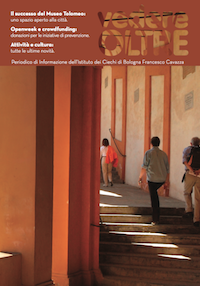The "Consortium of Bologna's Ancient Institutions" was established in the spring of 2002 and was officially founded on October 28, 2004, thanks to the commitment of a group of directors of these institutions, inspired and guided by lawyer Stefano Graziosi and Dr. Guglielmo Franchi Scarselli. The aim was to establish relationships between institutions whose purposes were very different, but who have over time carried out initiatives in favour of vulnerable people and towards the cultural growth of Bolognese citizens, actively working for the continuity of the historical memory of the city of Bologna. Another purpose is to collaborate on the valorization of historical and cultural ideals and on the conservation of the institutions' traditions, which have for centuries given prestige to the city of Bologna, as well as enjoyment of their important artistic and archival heritage, which must not only be preserved but also be made available to scholars and citizens.
To become part of the Consortium, it is necessary to be located in the Bologna area, excluding entities of national institutions, to be a non-profit organization, to have laity origin and organization, even if religiously inspired, and to have been built prior to World War II.
Listed below are the 20 institutions that are part of the Consortium, by building dates: “Antichissima e Nobilissima Compagnia Militare dei Lombardi” (1170), “Fabbriceria di San Petronio” (1389), “Monte del Matrimonio” (1583), “Collegio Comelli” (1663), “Società Medica Chirurgica di Bologna” (1802), “Fondazione Pio Istituto Sordomute Povere” (1845), “Opera Pia dell’Immacolata” (1845), “Istituzione Asili Infantili di Bologna” (1847), “Fondazione Gualandi a favore dei Sordi” (1850), “Fondazione Sorbi Nicoli” (1873), “Opera Pia DaVia Bargellini” (1874), “Fondazione Augusta Pini e Istituto del Buon Pastore” (1874), “Ente Morale Case di Riposo S. Anna e S. Caterina” (1875), “La Salsamentari” (1876), “Istituto dei Ciechi Francesco Cavazza” (1881), “Associazione per le Arti Francesco Francia” (1894), “Comitato per Bologna Storica e Artistica” (1899), “Casa Famiglia di Lavoro per Donne Cieche” (1927), “La Fameja Bulgnèisa” (1928) and the “ASP Città di Bologna” (which has recently received the heritage of the “Fondazione Alberto Dallolio e Alessandro Manservisi”, of the “Fondazione Innocenzo Bertocchi”, of “IPAB Istituto Giovanni XXIII”, of the “Istituto Clemente Primodì”, of the “Istituti Educativi di Bologna”, of the “Istituzione Cassoli Guastavillani” and of the “Opera Pia dei Poveri Vergognosi”).

In June 2016, the Assembly has renewed its Board of Directors, electing nine members. Their names are: Piero Bullini of the “Antichissima e Nobilissima Compagnia Militare dei Lombardi”, Michele Borra and Elio De Leo of the '"Istituto dei Ciechi Francesco Cavazza", Roberto Corinaldesi of the “Società Medica Chirurgica Bolognese”, Giovanni Delucca of the “Opera Pia Davia Bargellini”, Amelia Luca of the “Monte del Matrimonio”, Luigi Enzo Mattei of the “Associazione per le Arti Francesco Francia”, Gianluigi Pagani of the “Fabbriceria di San Petronio” and Massimiliano Rusconi Rizzi of the “Fondazione Pio Istituto Sordomute Povere”. The Council then appointed Prof. Roberto Corinaldesi as Coordinator of the Consortium and lawyer Gianluigi Pagani as Deputy Coordinator.
The Board of Directors immediately took action to meet the representatives of the institutional and economic organizations of Bologna (Archbishop, Prefect, Mayor, Magnificent Rector, President of ASCOM) to introduce the Consortium and to put forward collaborative projects.
They also agreed to have other institutions join the Consortium and to develop a website, which will be online within a few months. In addition, the Consortium has put in place a valuable collaborative relationship with several schools, to organize meetings with high school students and to host training sessions. A newsletter has also been issued to inform about activities in anticipation of a conference on "Science, Assistance and Benevolence", to be held in the fall, and "Open Day 2017", a day during which the institutions that will join the initiative will be open to the public to present their artistic, cultural and historical treasures. To this end, initiatives and events were also organized by individual institutions.

It is obvious that the Consortium's Board of Directors will increase its activities in favour of Bologna and its citizens, involving schools, organizing cultural events, and opening the doors of the various institutions so that people can get to know more about the considerable historical, artistic and cultural heritage of our city.





.png)